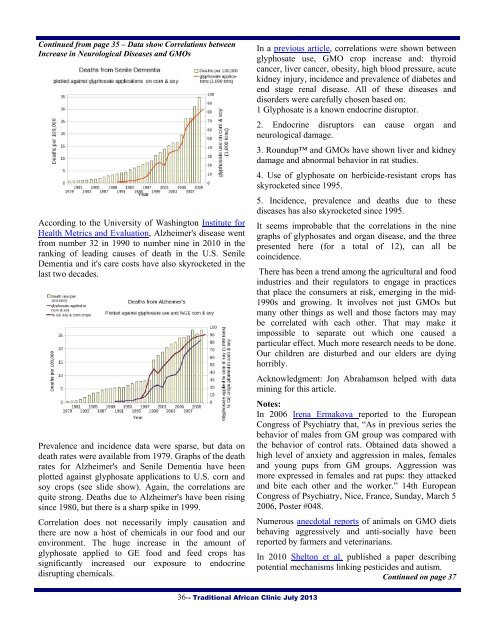Continued from page 35 – Data show Correlations betweenIncrease in Neurological Diseases <strong>and</strong> GMOsAccording to the University of Washington Institute forHealth Metrics <strong>and</strong> Evaluation, Alzheimer's disease wentfrom number 32 in 1990 to number nine in 2010 in theranking of leading causes of death in the U.S. SenileDementia <strong>and</strong> it's care costs have also skyrocketed in thelast two decades.Prevalence <strong>and</strong> incidence data were sparse, but data ondeath rates were available from 1979. Graphs of the deathrates for Alzheimer's <strong>and</strong> Senile Dementia have beenplotted against glyphosate applications to U.S. corn <strong>and</strong>soy crops (see slide show). Again, the correlations arequite strong. Deaths due to Alzheimer's have been risingsince 1980, but there is a sharp spike in 1999.Correlation does not necessarily imply causation <strong>and</strong>there are now a host of chemicals in our food <strong>and</strong> ourenvironment. The huge increase in the amount ofglyphosate applied to GE food <strong>and</strong> feed crops hassignificantly increased our exposure to endocrinedisrupting chemicals.In a previous article, correlations were shown betweenglyphosate use, GMO crop increase <strong>and</strong>: thyroidcancer, liver cancer, obesity, high blood pressure, acutekidney injury, incidence <strong>and</strong> prevalence of diabetes <strong>and</strong>end stage renal disease. All of these diseases <strong>and</strong>disorders were carefully chosen based on:1 Glyphosate is a known endocrine disruptor.2. Endocrine disruptors can cause organ <strong>and</strong>neurological damage.3. Roundup <strong>and</strong> GMOs have shown liver <strong>and</strong> kidneydamage <strong>and</strong> abnormal behavior in rat studies.4. Use of glyphosate on herbicide-resistant crops hasskyrocketed since 1995.5. Incidence, prevalence <strong>and</strong> deaths due to thesediseases has also skyrocketed since 1995.It seems improbable that the correlations in the ninegraphs of glyphosates <strong>and</strong> organ disease, <strong>and</strong> the threepresented here (for a total of 12), can all becoincidence.There has been a trend among the agricultural <strong>and</strong> foodindustries <strong>and</strong> their regulators to engage in practicesthat place the consumers at risk, emerging in the mid-1990s <strong>and</strong> growing. It involves not just GMOs butmany other things as well <strong>and</strong> those factors may maybe correlated with each other. That may make itimpossible to separate out which one caused aparticular effect. Much more research needs to be done.Our children are disturbed <strong>and</strong> our elders are dyinghorribly.Acknowledgment: Jon Abrahamson helped with datamining for this article.Notes:In 2006 Irena Ermakova reported to the EuropeanCongress of Psychiatry that, “As in previous series thebehavior of males from GM group was <strong>com</strong>pared withthe behavior of control rats. Obtained data showed ahigh level of anxiety <strong>and</strong> aggression in males, females<strong>and</strong> young pups from GM groups. Aggression wasmore expressed in females <strong>and</strong> rat pups: they attacked<strong>and</strong> bite each other <strong>and</strong> the worker.” 14th EuropeanCongress of Psychiatry, Nice, France, Sunday, March 52006, Poster #048.Numerous anecdotal reports of animals on GMO dietsbehaving aggressively <strong>and</strong> anti-socially have beenreported by farmers <strong>and</strong> veterinarians.In 2010 Shelton et al. published a paper describingpotential mechanisms linking <strong>pesticides</strong> <strong>and</strong> autism.Continued on page 3736-- Traditional African Clinic July 2013
Continued from page 36- Data show Correlations betweenIncrease in Neurological Diseases <strong>and</strong> GMOsIn 2006, Gr<strong>and</strong>jean <strong>and</strong> L<strong>and</strong>rigan reported ondevelopmental neuro<strong>toxicity</strong> of industrial chemicals.“Neurodevelopmental disorders such as autism, attentiondeficit disorder, mental retardation, <strong>and</strong> cerebral palsyare <strong>com</strong>mon, costly, <strong>and</strong> can cause lifelong disability. ...Exposure to these chemicals during early fetaldevelopment can cause brain injury at doses much lowerthan those affecting adult brain function.”Data sources:Alzheimer's & Senile Dementia death data: CDC<strong>com</strong>pressed mortality filesAutism prevalence: CDC:1975* & 1995* from Nature, vol. 479, Nov. 2011Autism IDEA data: 1992-19981999-2010http://nces.ed.gov/FastFacts/display.asp?id=64U.S. Dept. of Education, National Center for EducationStatistics (2012). Digest of Education Statistics, 2011(NCES 2012-001), Chapter 2.Glyphosate: USDA:NASS National AgriculturalStatistics Service (NASS)Percent GE corn & soy data:1996-1999 data: USDA Agricultural Economic ReportNo. (AER-810) 67 pp, May 20022000-2012 data: USDA:NASS National AgriculturalStatistics ServiceSuggested by the author:• Data trends show correlation between increasein organ disease <strong>and</strong> GMOs• GMOs are prevalent in the U.S. food supply• GMO crops increase pesticide use (Photos)http://www.examiner.<strong>com</strong>/article/data-show-correlationsbetween-increase-neurological-diseases-<strong>and</strong>-gmos☻☻☻☻☻Popular Herbicide moreDeadly to Liver Cells than itsActive Chemical AloneAug 18, 2009Gasniera C, C Dumontb, N Benachoura, E Claira, MCChagnonb <strong>and</strong> GE Séralini. 2009. Glyphosate-based<strong>herbicides</strong> are toxic <strong>and</strong> endocrine disruptors inhuman cell lines.Toxicology doi:10.1016/j.tox.2009.06.006.Synopsis by Negin P. Martin, Ph.DVery low doses of some types of the herbicide Roundupcan disrupt human liver cell function; the formulations'<strong>toxicity</strong> may be tied to their "inactive" ingredients ratherthan the active weed-killing ingredient glyphosate.French scientists report that a number of Roundupformulations tested at very dilute concentrations can alterhormone actions <strong>and</strong> cause human liver cells to die within24 hours of treatment.The <strong>toxicity</strong> of some of the formulations was independentof how much glyphosate – the active herbicide in Roundup– they contained, suggesting it is other "inert" ingredientsthat may alone – or in <strong>com</strong>bination with each other <strong>and</strong>/orthe weedkiller – assault the cells. This study's results aresimilar to prior studies – as reported in a recentEnvironmental Health News article – that find humanembryo cells are affected more by the Roundupformulations <strong>and</strong> an inert ingredient than by the activeingredient.The levels of Roundup used in this study are similar towhat is typically found in food crops or animal feed treatedwith Roundup. Because of this, it is possible that people,livestock <strong>and</strong> wildlife may be exposed to levels of theherbicide mix that can damage cells.Glyphosate is harmful to humans <strong>and</strong> animals even at avery low dose. It is often tested by itself in regulatorystudies to determine if the Roundup formulation is toxic.However, according to this study, levels of glyphosate inRoundup formulations are not good indicators of <strong>toxicity</strong>.The ingredients responsible for the increased potency ofRoundup formulations seen in this study – as <strong>com</strong>pared topurified glyphosate – remain unknown. The chemicalformulas of herbicide additives are generally protected astrade secrets, <strong>and</strong> the researchers did not try to chemicallyidentify them. Therefore, their effects cannot be easilyinvestigated <strong>and</strong> they remain undetected in the environment.Roundup was developed as a weapon against weeds. Manygenetically modified (GM) plants have been developed totolerate Roundup. Today, Roundup is the most widely usedweedkiller in the world <strong>and</strong> 75 percent of all GM plants areengineered to resist the herbicide. Monsanto agricultural<strong>com</strong>pany produces both Roundup <strong>and</strong> Roundup-resistantGM plants.37-- Traditional African Clinic July 2013Four Roundup formulations – Roundup Express 7.2 (R7.2),Bioforce (R360), Gr<strong>and</strong>s Travaux (R400) <strong>and</strong> Gr<strong>and</strong>sTravaux Plus (R450) – were tested in this study.Continued on page 38
















